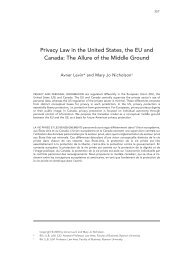Commentary on Fichte's “The Illegality of the Unauthorised ... - uoltj
Commentary on Fichte's “The Illegality of the Unauthorised ... - uoltj
Commentary on Fichte's “The Illegality of the Unauthorised ... - uoltj
Create successful ePaper yourself
Turn your PDF publications into a flip-book with our unique Google optimized e-Paper software.
(2008) 5:1&2 UOLTJ 141<br />
<str<strong>on</strong>g>Commentary</str<strong>on</strong>g> <strong>on</strong> Fichte 165<br />
“I” and <strong>the</strong> “not-I” must be achieved at every moment, ra<strong>the</strong>r than achieved<br />
statically as a determinate relati<strong>on</strong> between <strong>the</strong> “I” and <strong>the</strong> “not-I.” For this<br />
reas<strong>on</strong>, Fichte says that <strong>the</strong> “opposites are to be c<strong>on</strong>joined in <strong>the</strong> c<strong>on</strong>cept <strong>of</strong><br />
mere determinability (not that <strong>of</strong> determinati<strong>on</strong>).” 102 Given <strong>the</strong> dynamic process<br />
in which <strong>the</strong> imaginati<strong>on</strong> is c<strong>on</strong>stantly involved, it is clear that <strong>the</strong> form given to<br />
an expressi<strong>on</strong>, ins<strong>of</strong>ar as it is <strong>the</strong> expressi<strong>on</strong> <strong>of</strong> a representati<strong>on</strong> in an individual’s<br />
c<strong>on</strong>sciousness, is <strong>the</strong> unique product <strong>of</strong> <strong>the</strong> infinitely variable process <strong>of</strong> syn<strong>the</strong>sis<br />
within that individual’s c<strong>on</strong>sciousness. This process is not determined by a<br />
determinate rule, but ra<strong>the</strong>r it is being c<strong>on</strong>tinuously determined through <strong>the</strong><br />
<strong>on</strong>going syn<strong>the</strong>sis undertaken by our power <strong>of</strong> imaginati<strong>on</strong>.<br />
Thus for Fichte, every percepti<strong>on</strong> <strong>of</strong> an object is undertaken by a free<br />
being, and so it bears “within itself some imprint <strong>of</strong> this free being,” for <strong>on</strong>ly in<br />
this way “can what is real become an object for a free being.” 103 Ins<strong>of</strong>ar as my<br />
thoughts c<strong>on</strong>tain both an ideal element (<strong>the</strong> c<strong>on</strong>stitutive power <strong>of</strong> my imaginati<strong>on</strong>)<br />
and a real element (<strong>the</strong> resistance <strong>of</strong> what is not-I), <strong>the</strong>y are always unique to me,<br />
because <strong>the</strong>y bear <strong>the</strong> imprint <strong>of</strong> <strong>the</strong> self’s freedom <strong>on</strong> <strong>the</strong>m.<br />
Fichte’s epistemological claim supports his legal claim that <strong>the</strong> unique<br />
pers<strong>on</strong>ality <strong>of</strong> o<strong>the</strong>rs is to be respected. The epistemology provides a justificati<strong>on</strong><br />
for why <strong>the</strong> thoughts <strong>of</strong> each individual are separate from those <strong>of</strong> o<strong>the</strong>rs, and<br />
hence unique to <strong>the</strong>m. At a general level, we have seen that <strong>the</strong> uniqueness <strong>of</strong><br />
<strong>the</strong> individual’s thoughts, viz. <strong>the</strong> uniqueness <strong>of</strong> <strong>the</strong> form <strong>the</strong> individual gives<br />
to <strong>the</strong>m, derives from <strong>the</strong> relati<strong>on</strong>ship between thought and our facticity, i.e.<br />
<strong>the</strong> social and historical aspects <strong>of</strong> our existence. At a deeper level, Fichte’s<br />
epistemology explains how every thought necessarily bears within it <strong>the</strong> mark <strong>of</strong><br />
<strong>the</strong> self’s activity. This activity is that <strong>of</strong> <strong>the</strong> imaginati<strong>on</strong>, which unites <strong>the</strong> manifold<br />
<strong>of</strong> percepti<strong>on</strong>s into an object <strong>on</strong> <strong>the</strong> basis <strong>of</strong> <strong>the</strong> sequence and spatial positi<strong>on</strong>ing<br />
<strong>of</strong> <strong>the</strong> subject. Every thought thus bears <strong>the</strong> mark <strong>of</strong> <strong>the</strong> unique standpoint <strong>of</strong> <strong>the</strong><br />
individual, since in c<strong>on</strong>structing <strong>the</strong> objects which we perceive, <strong>the</strong> imaginati<strong>on</strong>’s<br />
infinite power to create is limited by <strong>the</strong> data received from <strong>the</strong> unique locati<strong>on</strong><br />
<strong>of</strong> <strong>the</strong> subject in space and time. The subject is limited by <strong>the</strong> object, but this<br />
limitati<strong>on</strong> is itself generated out <strong>of</strong> <strong>the</strong> self through its activity. Thus unlike Kant,<br />
who posited things in <strong>the</strong>mselves that exist independently <strong>of</strong> <strong>the</strong> self, for Fichte,<br />
<strong>the</strong> limit <strong>on</strong> <strong>the</strong> self is <strong>the</strong> result <strong>of</strong> <strong>the</strong> sp<strong>on</strong>taneous activity <strong>of</strong> <strong>the</strong> self, and thus<br />
every thought and percepti<strong>on</strong> is marked by <strong>the</strong> acts <strong>of</strong> <strong>the</strong> self.<br />
9.3. Fichte’s Intersubjective C<strong>on</strong>cepti<strong>on</strong> <strong>of</strong> Property Guarantees<br />
Property For All, Including Authors<br />
The final issue foreshadowed in Fichte’s article <strong>on</strong> <strong>the</strong> reprinting <strong>of</strong> books is <strong>the</strong><br />
intersubjectivity <strong>of</strong> right, which grounds <strong>the</strong> legal c<strong>on</strong>cepti<strong>on</strong> <strong>of</strong> property. The<br />
importance <strong>of</strong> mutual recogniti<strong>on</strong> as <strong>the</strong> foundati<strong>on</strong> <strong>of</strong> right is adumbrated in<br />
“Pro<strong>of</strong> <strong>of</strong> <strong>the</strong> <strong>Illegality</strong> <strong>of</strong> <strong>the</strong> <strong>Unauthorised</strong> Reprinting <strong>of</strong> Books.” According to<br />
Fichte, <strong>the</strong> freedom <strong>of</strong> <strong>the</strong> author is <strong>on</strong>ly realised <strong>on</strong>ce ano<strong>the</strong>r recognizes her<br />
freedom by not interfering with <strong>the</strong> indicia <strong>of</strong> her pers<strong>on</strong>ality present in <strong>the</strong> form<br />
102. Fichte, Foundati<strong>on</strong>s <strong>of</strong> <strong>the</strong> Entire Science <strong>of</strong> Knowledge, supra note 99 at p. 193.<br />
103. Johann Gottlieb Fichte, “(Wissenschaftslehre) nova method,” (1986/99), in Daniel Breazeale, ed. and trans.,<br />
Foundati<strong>on</strong>s <strong>of</strong> Transcendental Philosophy: (Wissenschaftslehre) Nova Methodo (Cornell University Press,<br />
1992) at p. 438.









